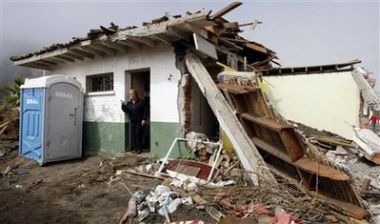Salvation Army responds to 8.2-magnitude earthquake in Chile

The Salvation Army is on the ground helping victims who suffered the effects of an 8.2 magnitude earthquake in northern Chile on 1 April.
President Michelle Bachelet declared a state of emergency in the South American nation soon after the initial quake, and thousands of civilians were evacuated from their homes in the region around Iquique – 1,100 miles north of the capital Santiago - as fears of a tsunami being triggered took hold.
A 2.5m wave flooded low-lying areas of Iquique and 8 people are reported to have died as a result of the disaster, but authorities are said to be relieved that the death toll is not much higher.
There has been significant structural damage in the region, however, and the country has been experiencing significant aftershocks in the days since the initial earthquake. On Monday, one aftershock measured 6.1 in magnitude.
The Salvation Army has thus sent relief teams to the region to provide assistance for those who are suffering in the wake of the catastrophe; in the community of Alto Hospicio alone, some 2,000 houses have been destroyed and 30 fishing boats - the means of many families' livelihoods - washed away.
Distributions of emergency relief items such as tents, blankets, mattresses and food are already being planned and mobile canteens will be sent to the worst-affected areas, while longer-term rebuilding plans are still being negotiated.
It is not the first time Chile has had to deal with a disaster such as this. It is the site of three of the ten biggest earthquakes ever recorded, including the world-record holder: the Great Chilean Earthquake of 1960 which had a magnitude of 9.5 and killed over 1,600 people.











